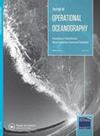Evaluating wind datasets for wave hindcasting in the NW Iberian Peninsula coast
IF 2.4
3区 地球科学
Q4 METEOROLOGY & ATMOSPHERIC SCIENCES
引用次数: 7
Abstract
ABSTRACT The available wind datasets can be exploited to support the setup of accurate wave models, able to reproduce and forecast extreme event scenarios. It is of utmost importance in the actual context of climate change. This study focuses on evaluating the performance of a numerical wave model, using different wind datasets, helping to create a tool to assess coastal risks, and further on to support the future implementation of reliable warning systems based on numerical models. The numerical model SWAN was implemented, configured and validated for the NW Iberian Peninsula coast, as a test case region. A period of two months, from December 2013 to January 2014, was simulated due to the winter storms that crossed the area. Six distinct wind datasets were selected to test their suitability in regional wave modelling. The results were validated against several sets of wave buoy data, considering wave parameters such as significant wave height, mean wave period and peak direction. The implemented wave model configuration allowed the representation of the wave evolution with relatively good accuracy. All the wind datasets were able to produce reasonably good wave condition estimates. The dataset that best represented the wave properties varied from one wave parameter to another, but the most reliable for the selected region was the reanalysis product generated at the European Centre for Medium-Range Weather Forecasts.评估伊比利亚半岛西北部海岸风数据集的波浪后推
现有的风数据集可以用来支持精确的波浪模型的建立,能够重现和预测极端事件情景。在气候变化的实际背景下,这是极其重要的。本研究的重点是评估数值波浪模型的性能,使用不同的风数据集,帮助创建评估沿海风险的工具,并进一步支持基于数值模型的可靠预警系统的未来实施。SWAN数值模型在伊比利亚半岛西北部海岸作为测试用例区域进行了实施、配置和验证。2013年12月至2014年1月,由于冬季风暴穿过该地区,模拟了两个月的时间。选择了六个不同的风数据集来测试它们在区域波浪模拟中的适用性。考虑有效波高、平均波周期和波峰方向等波浪参数,利用多组波浪浮标数据对结果进行验证。所实现的波浪模型配置允许以相对较好的精度表示波浪的演变。所有的风数据集都能够产生相当好的波浪状况估计。最能代表波浪特性的数据集因波浪参数而异,但对于选定区域来说,最可靠的数据集是欧洲中期天气预报中心生成的再分析产品。
本文章由计算机程序翻译,如有差异,请以英文原文为准。
求助全文
约1分钟内获得全文
求助全文
来源期刊
CiteScore
7.50
自引率
9.70%
发文量
8
审稿时长
>12 weeks
期刊介绍:
The Journal of Operational Oceanography will publish papers which examine the role of oceanography in contributing to the fields of: Numerical Weather Prediction; Development of Climatologies; Implications of Ocean Change; Ocean and Climate Forecasting; Ocean Observing Technologies; Eutrophication; Climate Assessment; Shoreline Change; Marine and Sea State Prediction; Model Development and Validation; Coastal Flooding; Reducing Public Health Risks; Short-Range Ocean Forecasting; Forces on Structures; Ocean Policy; Protecting and Restoring Ecosystem health; Controlling and Mitigating Natural Hazards; Safe and Efficient Marine Operations

 求助内容:
求助内容: 应助结果提醒方式:
应助结果提醒方式:


